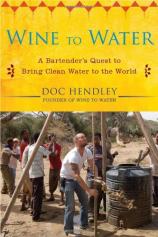Reading Group Guide
Discussion Questions
Wine to Water: A Bartender's Quest to Bring Clean Water to the World

1. How much did you know about the global water crisis before reading Wine to Water? Do you agree with Doc’s assessment of the situation? Why doesn’t it receive more media attention?
2. Doc lets the reader decide what lay behind his inspiration to found Wine to Water, saying only “it could’ve simply been the whiskey, or the conversation I had earlier that day, or divine inspiration, or all of it mashed together” (p. 29). What do you think?
3. Against his mother’s objections, Doc dropped out of college after his first semester because, “there was a big world out there waiting to be explored beyond those classroom walls, and I wanted to taste it” (p. 100). Would a break between high school and college benefit most young adults, or is Doc’s experience unusual?
4. On the flight out to Africa, Doc felt uncomfortable --- ironically, because he was wearing clothes that he thought would make him fit in better. He later wrote, “There’s a time and a place for trying to blend in … [but] it’s key to stay true to your own personality or you’ll risk looking like a kook every time.” (p. 56). Have you ever had a similar revelation?
5. When Doc returns to North Carolina after his first trip to Darfur, he found it difficult to tell his friends and family about his experiences because “at the end of the day, they were simply too far removed from the world that had become my life to understand” (p. 132). Has the divide between the world’s haves and have-nots always been this stark, or has the disparity increased in recent years?
6. After the Janjaweed destroyed Marla Camp and the water systems that Wine to Water had put in place, Doc decided to travel to Melem --- a Janjaweed stronghold --- to repair their wells as both a “bribe … and a way to demonstrate … my belief that every human being in this world, regardless of race, religion, or political affiliation, deserves unconditional access to clean water” (p. 139). Since the Janjaweed later attacked Doc’s convoy, was his good-will gesture all for nothing?
7. Living under the constant threat of danger, both Doc and Coy “were in serious need of therapy, and fisticuffs were … a serviceable substitute for a shrink” (p. 151). Can you relate to their need to release violent feelings with actual violence? Is it a form of “therapy” that only men would find helpful?
8. In a place like Darfur --- where death is always an imminent threat, young girls are frequently raped, and a boy of twelve can be a hardened killer --- does childhood lose all its innocence?
9. Doc’s prose is very frank and casual --- just like he is. Did you like his narrative voice? How did it add --- or detract --- from the story he told?
10. Now married with two young children of his own, Doc continues to work in the field with Wine to Water. Is philanthropy like Doc’s something innate, or something that we can learn?
Wine to Water: A Bartender's Quest to Bring Clean Water to the World
- Publication Date: January 5, 2012
- Hardcover: 288 pages
- Publisher: Avery
- ISBN-10: 1583334629
- ISBN-13: 9781583334621







